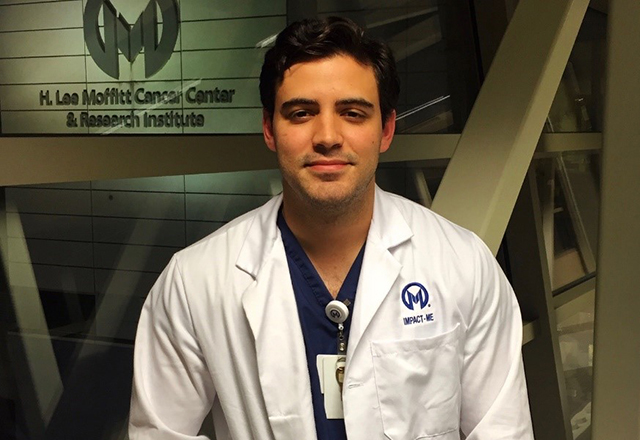When Jhpiego, a nonprofit affiliate of The Johns Hopkins University founded in 1974, needed a vaccine team lead, Luis Monsalve was a perfect fit. He had obtained a biomedical science degree from the University of South Florida in 2015, followed by a Master of Health Science degree in biochemistry and molecular biology from the Johns Hopkins Bloomberg School of Public Health in 2017.
His time in graduate school at Bloomberg gave him a strong basis of knowledge in infectious disease, including influenza and SARS/MERS, which would become all too relevant in 2020. In August of that year, he was working at Pharmaron as a coordinator for Pfizer’s phase III COVID-19 vaccine trial. Monsalve had ample experience explaining the vaccines to participants to ease hesitancy. Many people, especially those not in the health care field, were wary because the vaccine was developed so quickly.
“It was important to explain that resources were gathered globally in an unprecedented way due to the urgency of the pandemic, and that mRNA technology had been in development for a long time,” says Monsalve. He assured participants by explaining that tens of thousands of people had already gone through phases I and II, and that strict approval processes were followed just as with any other vaccine. Despite concerns, Monsalve notes that most participants hoped to receive the vaccine in the trial and not the placebo.
After being hired by Jhpiego, Monsalve could see the fruits of his labor during the Pfizer trial. In partnership with the Baltimore City Health Department and many other care providers, such as the University of Maryland Medical System, Monsalve’s team at Jhpiego is working to help Baltimore City reach more than 80% herd immunity to SARS-CoV-2. Specifically, Monsalve helps train staff members who run mass vaccination sites in Baltimore, such as the one at M&T Bank Stadium. He also assists in operating the mobile vaccine clinics that help to reach areas of the city with the lowest vaccination rates.
Through the new position of vaccine team lead, Monsalve has been able to see much of the behind-the-scenes work of vaccine distribution. At times, gaps in communication occur among coordinating partners at vaccination sites, affecting efficiency and sometimes resulting in unused doses. Despite these minor issues, vaccine distribution has been impressive overall and ahead of the predicted schedule in both Baltimore and the U.S. as a whole.
Monsalve notes that Jhpiego and his team work hard to tailor the vaccine distribution strategy to help populations in the community that may be the most hesitant. Due to the long and controversial history of racism, dishonesty and inequity in medicine in Baltimore as well as the entire country, an air of mistrust of medical providers associated with Johns Hopkins is understandable. “For these reasons and many more, the burden should not be on communities of color to blindly trust the COVID-19 vaccine,” Monsalve says.
“Baltimore vaccine response has been reaching key populations who are at special risk for COVID-19: people experiencing homelessness and living in communal settings; women who are pregnant or breastfeeding; immigrants or people who are Latinx; older adults; individuals with disabilities, including those with limited mobility; the Jewish Orthodox community and young men,” explains Monsalve. “Using mobile response teams to make COVID-19 vaccines available to people in these groups is one of the main ways Baltimore is making sure we use a pro-equity approach to protect people against COVID-19.”
To learn where you can receive a vaccination in Maryland, to read FAQs and to explore vaccine data, visit Maryland’s coronavirus vaccination website.
References
Related content
- Distributing Vaccines: Smallpox and the History of Vaccine Campaigns
- Anti-Vax to Anti-Mask: Processing Anti-Science Claims During a Pandemic
- Different rules for the vaccinated? It’s a slippery slope.
Want to read more from the Johns Hopkins School of Medicine? Subscribe to the Biomedical Odyssey blog and receive new posts directly in your inbox.

Pingback: Equal Access for Trainees in the Wake of COVID-19 | Biomedical Odyssey
Thanks for this interesting topic! It's very important life story, which completely describe situation with medicine and doctors work in pandemic times. I still believe that vaccine will help and as many people as possible get vaccinated.
Comments are closed.